6 must-watch governor races in 2014
Thirty-six states are holding gubernatorial elections this year. These are the handful that stand out.
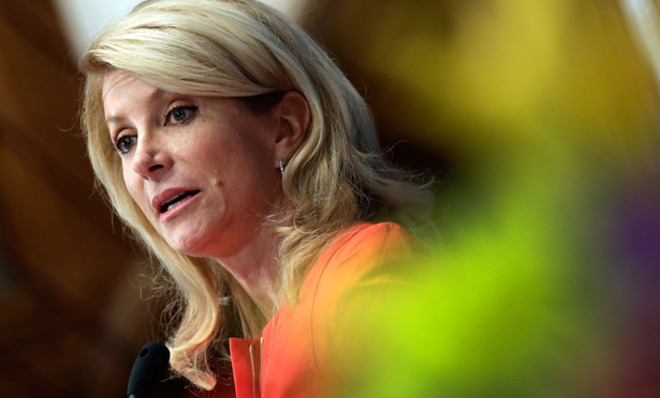
A free daily email with the biggest news stories of the day – and the best features from TheWeek.com
You are now subscribed
Your newsletter sign-up was successful
More than two-thirds of the country's states are holding gubernatorial races this year, making the 2014 midterms an important election cycle for state-level politics. Both Democrats and Republicans see pick-up opportunities, as first-term incumbents like Florida's Rick Scott (R) and Colorado's John Hickenlooper (D) find themselves facing an electorate that has soured on their respective brands of leadership.
Both parties know the stakes. Thanks to the dysfunction in Washington, D.C., the state capitols are increasingly becoming the places to get things done. Furthermore, governors have tremendous power to set priorities and carry out federal mandates like health care reform.
And for political watchers, there is this simple fact: The results of these races will be seen as a harbinger of what's to come in the next presidential election.
The Week
Escape your echo chamber. Get the facts behind the news, plus analysis from multiple perspectives.

Sign up for The Week's Free Newsletters
From our morning news briefing to a weekly Good News Newsletter, get the best of The Week delivered directly to your inbox.
From our morning news briefing to a weekly Good News Newsletter, get the best of The Week delivered directly to your inbox.
Of the 36 contests, The Week takes a look at six key campaigns that will have implications for this year and beyond.
Wisconsin
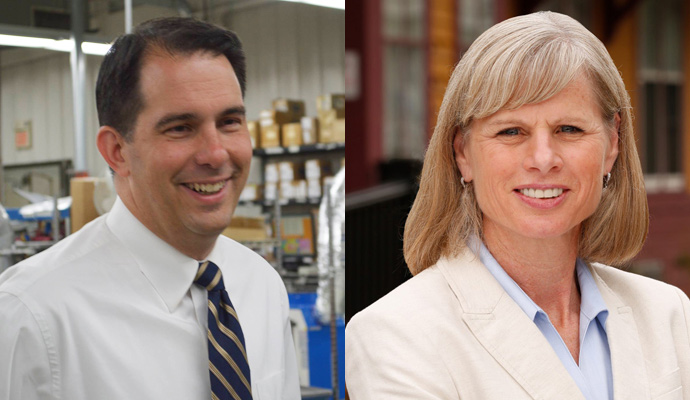
The candidates: First-term Gov. Scott Walker (R) is up for re-election. His Democratic challenger, Mary Burke, is a former Wisconsin secretary of commerce and Trek Bicycle Corp. executive.
The big issues: This election is all about payback and presidential ambitions. Democrats are going to hammer Walker for gutting public unions, and will argue that his policies hurt the middle class. Republicans have already begun attacking Burke as a tax-and-spend liberal who would balloon Wisconsin's debt.
A free daily email with the biggest news stories of the day – and the best features from TheWeek.com
The context: Thanks to a book and his high-profile move to weaken the collective bargaining rights of public-sector unions in 2011, Walker is one of a handful of Republicans generating early 2016 buzz. But first he'll have to win re-election in the Badger State, a tough task as Democrats close ranks to oust the man they unsuccessfully tried to recall. Walker is a polarizing figure in Wisconsin — 50 percent approve of the job he's doing while 46 percent don't, and those numbers haven't moved much in close to two years. He is expected to win, but Democrats think they have a shot. President Obama won the state in 2012 by close to seven points, and many of Walker's policies are unpopular among his constituents, more than half of whom say they disapprove of his unwillingness to expand Medicaid under the Affordable Care Act. Burke, who is largely unknown across the state, is focusing her campaign on job creation, an area where Wisconsinites feel they are lagging behind the rest of the country. Her considerable personal wealth has allowed her to hire highly sought-after campaign advisers, including Jim Margolis, who served as Obama's advertising strategist in 2008 and 2012.
What the polls say: An October Marquette University Law School poll found Walker leading Burke by two points, 47 to 45 percent. The same survey noted that a potential candidate, state Sen. Kathleen Vinehout (D), was trailing Walker by three points, 47 to 44 percent. The fact that both opponents are within striking distance of the incumbent suggests that Democratic voters are approaching this election with an "anybody-but-Walker" mentality.
The money war: Burke raised $1.8 million from October to December, though $400,000 of it was her own money. The first six months of 2013 were good for Walker, who took in $3.5 million. The details of his latest fundraising haul won't be available until the end of January.
The fiercest ad: This campaign is just getting started; so far, one of the biggest ad buys has come from Wisconsin Manufacturers & Commerce, a business advocacy group that spent $1 million on pro-Walker ads.
Texas
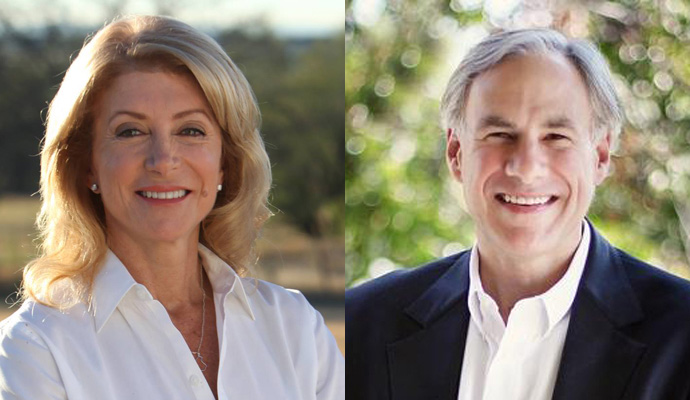
The candidates: When Gov. Rick Perry (R) decided not to run for a fourth term, Texas Attorney General Greg Abbott became his heir apparent. State Sen. Wendy Davis, who represents Fort Worth, is the standout candidate for Democrats.
The big issues: Education will be a major theme in the campaign. Davis unveiled a plan to increase teacher pay and hire more classroom aides, while Abbott is pushing for more charter schools. Abortion will also be central to this race, since Davis made a national name for herself when she conducted an 11-hour filibuster over abortion restrictions. Abbott has spent much of his time talking about states' rights, telling voters he will fight against ObamaCare and other regulations coming out of Washington, D.C.
The context: The Lone Star state has long been a bastion of social conservatism, but Democrats say they have a competitive gubernatorial candidate in Davis. A Republican has occupied the governor's mansion for close to 20 years, but Davis' filibuster and resulting popularity have led party operatives to think they can capitalize on that star power to at least loosen the GOP's stranglehold on state politics. (A growing Latino population also gives the Democrats hope that one day they will be able to turn Texas blue again.) After a rocky start directing donors to the wrong campaign website, Davis is heading into 2014 with a message connecting Abbott to a troubled grant at the Cancer Prevention and Research Institute of Texas, which led to one person's indictment, and Abbott's affiliation with pay-day lenders. A handful of second-tier Republican candidates are challenging Abbott for the nomination, but the primary isn't expected to be competitive. The attorney general is well versed in state-wide politics, having run for his current office three times, and has a well-established political network that's ready to help him defeat Davis.
What the polls say: In a November poll from the University of Texas, Davis was trailing Abbott by six points. She's better known than her GOP opponent, but her support still fell outside the margin of error.
The money war: In the last six months of 2013, Davis scooped up $12.2 million from more than 71,000 donors. A chunk of her money came from out-of-state donors, a fact her opponent is planning to exploit throughout the campaign. Abbott, who came into the race with a $20 million war chest, raised $11.5 million, bringing his total cash on hand to to $27 million. Experts say Davis will have to raise at least $40 million to compete with Abbott.
The fiercest ad: Texas Right to Life didn't even wait until Davis declared her candidacy to hit her with a 60-second radio spot that called her an "abortion zealot" that puts the issue ahead of everything else. "Wendy Davis believes terminating babies even halfway through pregnancy is OK," the ad says. "Wendy Davis is wrong on life, wrong for our children, and wrong for Texas."
Florida
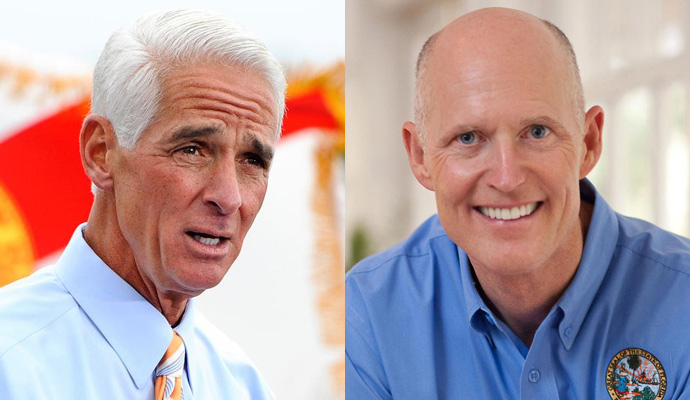
The candidates: Gov. Rick Scott (R) is looking for a second term. Former Gov. Charlie Crist, who has gone from being a Republican to an Independent and now a Democrat, is looking to get his old job back and faces former state Sen. Nan Rich in the primary.
The big issues: Florida was hit hard by the wave of foreclosures that took place during and after the 2008 financial crisis, and the state's $754 billion economy has been recovering slowly. Expect job creation to be an important topic, since Florida still hasn't climbed back to its pre-recession employment numbers, and rapid population growth is making it harder for people to find jobs. ObamaCare will be another key issue. Scott declined to accept expanded federal Medicaid funding under the Affordable Care Act, and one million Floridians lack health care coverage.
The context: This is going to be an ugly race. Scott has pledged to spend $100 million to keep his seat. As the co-founder and former executive of one of the largest health care companies in the country, he's got the personal checkbook to back it up. The governor has seen his popularity wane thanks to a sluggish economic recovery, his administration's purge of voter rolls, and the dismantling of the state's Department of Community Affairs. Crist also carries some major baggage coming into the race. He was a Republican and the governor up until 2010, when he unsuccessfully ran in the GOP primary for the Senate, losing to Marco Rubio. He stayed in the race, running as an Independent, but still failed to beat Rubio in the general election. He became a Democrat in 2012, signing the paperwork during a holiday party at the White House. Even though President Obama won Florida that same year by 73,000 votes, the president will still likely be a liability for Crist in this race. His disapproval rating is hovering around 57 percent in the Sunshine State.
What the polls say: Quinnipiac released a survey in late November that showed Crist's lead over Scott had dwindled to seven points. In March and June, the same firm found Crist ahead by 16 and 10 points, respectively. Even though Scott gained some ground, the poll had some bad news for the incumbent: 53 percent of respondents said he doesn't deserve to be re-elected. So far, most polls show Crist taking back the governor's mansion for Democrats. Even internal polling for the Scott campaign has Crist ahead by four points, 49 to 45 percent, among likely voters.
The money war: By October 2013, Scott had raised more than $18 million. His biggest contributors came from the health care, real estate, and gaming industries. Crist's first month as a candidate was similarly lucrative. The veteran politician raked in $2.1 million in November.
The fiercest ad: The Scott campaign released an ad in early November that used clips of Democrats criticizing Crist. In the spot, former Democratic Senate candidate Kendrick Meek says, "He can't be trusted,” and former Vice President Al Gore notes, "It's a little unusual to have someone flip-flop and then flop-flip."
Pennsylvania
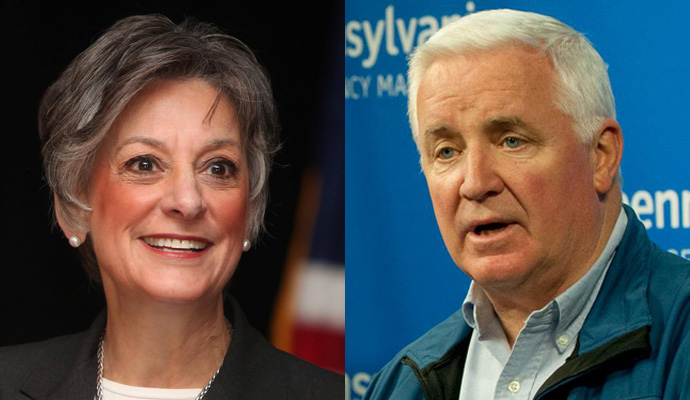
The candidates: Republican Gov. Tom Corbett, a former state attorney general, has his sights set on a second term. A slew of Democrats — businessman Max Myers, former state environmental official Katie McGinty, state Treasurer Rob McCord, Allentown Mayor Ed Pawlowski, Lebanon County Commissioner Jo Ellen Litz, U.S. Rep. Allyson Schwartz, businessman Tom Wolf, and former state official John Hanger — has emerged to unseat him.
The big issues: Fracking will dominate much of this race. Pennsylvanian voters have seen more and more of their state land disrupted by gas companies that pay very few taxes in return. Other major topics: Corbett's plan to expand Medicaid, which includes work search requirements, and a state probe into whether Corbett slowed down the Jerry Sandusky child abuse investigation as attorney general.
The context: Pennsylvanians have never failed to give a sitting governor a second term, but there's a first time for everything. Corbett is definitely one of the least popular governors in the country. His favorability ratings have taken a nose dive in the last few months after he made massive cuts to the state education budget, fought gay marriage, signed an anti-tax pledge, and cozied up to the natural gas companies. (In November, his approval rating slipped to 24 percent while two-thirds of Pennsylvanians disapproved of the job he's done.) He's hoping the crowded Democratic field will make for a messy primary, with the eventual winner emerging bruised and broke for the general election. Pennsylvanians are more centrist than conservative. The state rejected Mitt Romney by five points in 2012.
What the polls say:Despite the fact that most of Corbett's potential opponents have little name recognition across Pennsylvania, he still trails almost all of his challengers. In the latest Quinnipiac poll, released in December, Schwartz enjoyed the biggest lead, with 45 percent to Corbett's 37 percent. The same survey showed that 56 percent of voters believe he doesn't deserve a second term.
The money war: Schwartz announced that she raised $6.5 million last year, but $3.1 million of that was transferred from her congressional campaign. Wolf pulled in about $2.9 million, and has pledged to spend $10 million of his own money on the race. McCord's haul of $6.6 million includes $1.3 million left over from his last state-wide run and $1.7 million from his personal bank account. Corbett's numbers aren't available yet.
The fiercest ad: The Corbett campaign produced a 60-second web ad complete with a spinning globe and an announcer intoning, "There's a place that is rapidly becoming one of the most critical energy suppliers on the entire planet... And thanks to Tom Corbett, this place, known as Pennsylvania, has also become America's second-largest producer of natural gas." The spot, which touts the 200,000 jobs created by fracking, prompted Philadelphia Magazine to ponder if Corbett is running for governor of the universe.
Colorado
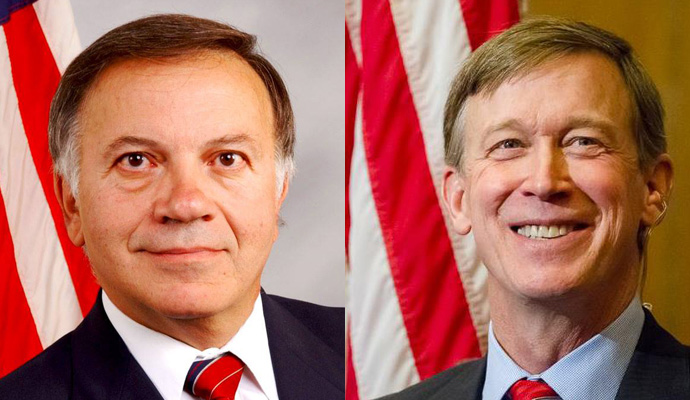
The candidates: Gov. John Hickenlooper (D) is running for re-election, and has six GOP challengers: Former state Senate Minority Leader Mike Kopp, businessman Jim Rundberg, former U.S. Rep. Tom Tancredo, state Sen. Greg Brophy, businessman Steve House, and Secretary of State Scott Gessler.
The big issues: Gun control will be front and center in this race. In March, the Democratic-controlled legislature passed two bills that require universal background checks and limit magazines to 15 rounds. The laws prompted a widespread backlash and a recall election that removed two Democratic state senators. Jobs will also be a hot topic. Colorado's unemployment rate has hovered around 6.5 percent.
The context: Hickenlooper seemed unbeatable in early 2013, but the state's new gun laws have weakened the governor. Another blow came in November when voters also resoundingly rejected a Democratic plan to increase the state income tax by $1 billion to fund a sweeping state-wide public school overhaul. Though President Obama won Colorado by close to five points in 2012, the mood in Colorado has changed. The incumbent's best hope for survival is a bruising Republican primary. Tancredo, who lost to Hickenlooper in 2010, is the front-runner, with 34 percent of voters saying he's the best candidate. The former congressman is a hard-liner on immigration reform, a position that won't play well with Colorado's growing Latino population. (At one point he opposed even legal immigration, and said Miami was like a Third World country because of the amount of Spanish spoken there.) Tancredo's GOP opponents have charged that his extreme statements are hurting their party's brand and that he can't win a state-wide election.
What the polls say: Forty-nine percent of Colorado voters thinks Hickenlooper doesn't deserve a second term while 42 percent think he does, according to a Quinnipiac poll released in November. Despite this, he is still leading his Republican challengers by anywhere from four to six points. Former state Senate Minority Leader Mike Kopp gets the closest to beating Hickenlooper, but falls short 40 to 44 percent.
The money war: The governor has the fundraising advantage. He raised the most of all candidates — $213,980 — in the third quarter of last year, bringing his cash on hand total to $733,773. Tancredo has fared the best of the Republican candidates, taking in $185,675. He's got $134,627 in the bank. Gessler, who received $109,397 in donations between July and September, is not too far behind with $88,270 cash on hand.
The fiercest ad: Tancredo released an ad titled "Hickenlooper's Monster," an animated spot designed to sway voters against the state income tax hike. "Once upon a time there was a prince named 'Hickenlooper' who lived in a mansion on a hill," the ad starts. "Hickenlooper was a tyrant and the people soon rebelled so he took away their swords and shields, and pardoned criminals from the city dungeon, but the townspeople still refused to bow to his ways." Spoiler alert: Frankenstein plays the part of the tax increase.
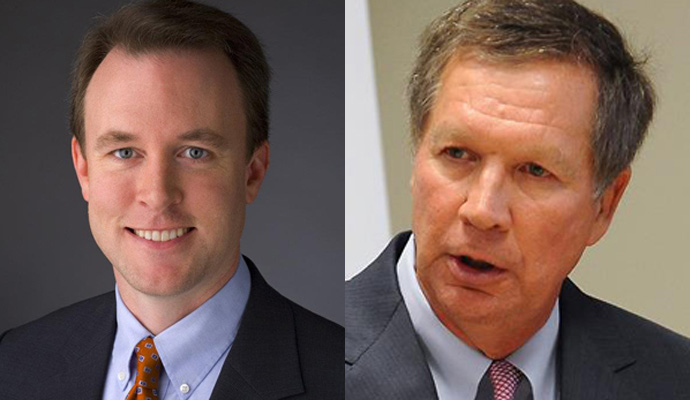
The candidates: First-term Republican Gov. John Kasich is seeking re-election. The Democrats had cleared the field for Cuyahoga County Executive Ed FitzGerald, though Hamilton County Commissioner Todd Portune has recently expressed interest in seeking the nomination. Charlie Earl, a former Republican state representative, is the libertarian candidate.
The big issues: Expect ObamaCare and jobs to be the two top issues. Kasich has supported expanding Medicaid through the Affordable Care Act, but has tried to argue he's not supporting the health reform law. On the economic front, after a strong 2012, Ohio has seen its numbers slide backward, and lost more than 12,000 jobs in November alone.
The context: Kasich won in 2010 thanks to a hard-charging conservative message that earned him the support of Tea Party Republicans. But after voters emphatically overturned his efforts to gut collective bargaining rights by a 22-point margin, the governor began moving to the center. His willingness to expand Medicare is a weakness heading into the election, as his Tea Party base rallies around his libertarian challenger. Democrats also see a major scandal brewing in JobsOhio, a privatized state development agency that isn't subject to stringent public-disclosure rules. FitzGerald, the candidate with the best chance of unseating Kasich, is struggling with low name recognition and a slow fundraising start.
What the polls say: Quinnipiac surveys from June and November show the race tightening. Over the summer, Kasich led 47 to 33 percent. But five months later, FitzGerald started closing the gap and was down 37 to 44 percent. He's still outside the margin of error, but 71 percent of voters in the second poll said they didn't know enough about the challenger to form an opinion about him, so there's lots of room for his numbers to go up.
The money war: The first half of 2013 was good for the incumbent, who raised $2.6 million and had $4.4 million cash on hand. FitzGerald got a slower start, amassing just $600,000 with a large chunk of that coming from the Democratic Party. He had just $544,000 in his campaign coffers at the end of June.
The fiercest ad: Television advertisements began hitting the airwaves last summer, a full 17 months before the election. Planned Parenthood released a spot that featured a rape victim saying she's "very sad for Ohio women." The ad criticized Kasich for essentially blocking federal funds for Planned Parenthood clinics and prohibiting rape-crisis counselors from discussing abortion.
Laura Colarusso is a freelance journalist based in Boston. She has previously written for Newsweek, The Boston Globe, the Washington Monthly and The Daily Beast.
-
 The billionaires’ wealth tax: a catastrophe for California?
The billionaires’ wealth tax: a catastrophe for California?Talking Point Peter Thiel and Larry Page preparing to change state residency
-
 Bari Weiss’ ‘60 Minutes’ scandal is about more than one report
Bari Weiss’ ‘60 Minutes’ scandal is about more than one reportIN THE SPOTLIGHT By blocking an approved segment on a controversial prison holding US deportees in El Salvador, the editor-in-chief of CBS News has become the main story
-
 Has Zohran Mamdani shown the Democrats how to win again?
Has Zohran Mamdani shown the Democrats how to win again?Today’s Big Question New York City mayoral election touted as victory for left-wing populists but moderate centrist wins elsewhere present more complex path for Democratic Party
-
 Millions turn out for anti-Trump ‘No Kings’ rallies
Millions turn out for anti-Trump ‘No Kings’ ralliesSpeed Read An estimated 7 million people participated, 2 million more than at the first ‘No Kings’ protest in June
-
 Ghislaine Maxwell: angling for a Trump pardon
Ghislaine Maxwell: angling for a Trump pardonTalking Point Convicted sex trafficker's testimony could shed new light on president's links to Jeffrey Epstein
-
 The last words and final moments of 40 presidents
The last words and final moments of 40 presidentsThe Explainer Some are eloquent quotes worthy of the holders of the highest office in the nation, and others... aren't
-
 The JFK files: the truth at last?
The JFK files: the truth at last?In The Spotlight More than 64,000 previously classified documents relating the 1963 assassination of John F. Kennedy have been released by the Trump administration
-
 'Seriously, not literally': how should the world take Donald Trump?
'Seriously, not literally': how should the world take Donald Trump?Today's big question White House rhetoric and reality look likely to become increasingly blurred


